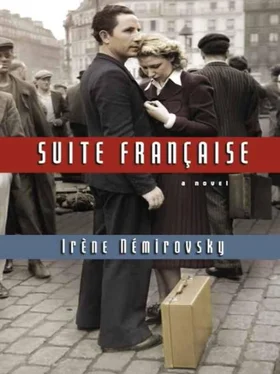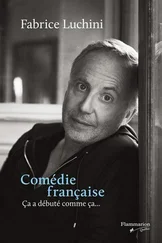"He's away on leave: he belongs to the whole regiment, to all the soldiers; one of them took him with them, Bonnet, the interpreter, the one your country friend was complaining about. They left for three days in Munich but the new orders mean they'll have to come back."
"Speaking of Bonnet, did you talk to him?"
"Madame, my friend Bonnet is not a simple fellow. Until now, he's been having some innocent fun, but if the husband starts getting frustrated, he's capable of getting really involved. Schadenfreude, do you understand? He could even fall in love for real, and if the young woman isn't faithful…"
"There's no question of that," said Lucile.
"She really loves that country bumpkin?"
"Without a doubt. And don't think that all the women around here are the same just because certain young girls let themselves get involved with your soldiers. Madeleine Sabarie is a good wife and a good Frenchwoman."
"I understand," said the officer, nodding his head.
He helped Lucile move the card table over to the window. She put out some antique crystal glasses cut with large facets, the wine carafe with the gilt silver stopper and some small painted dessert plates. They dated back to the First Empire and were decorated with military scenes: Napoleon inspecting the troops, Hussars in gold brocade setting up camp in a clearing, a parade along the Champ-de-Mars.
The German admired the strong, bright colours. "What beautiful uniforms! How I'd love to own a jacket embroidered in gold like that Hussar!"
"Have some cakes, mein Herr. They're home-made."
He looked at her and smiled.
"Madame, have you ever heard of those cyclones which rage in the South Seas? If I've understood what I've read, they form a sort of circle whose edges are made of wind and rain but whose centre is so still that a bird or even a butterfly caught in the eye of the storm wouldn't be harmed; their wings would remain unruffled, while all around them the most horrible damage was being unleashed. Look at this house! Look at us about to have our wine from Frontignan and our cakes, and think of what's going on in the rest of the world."
"I prefer not to think about it," Lucile replied sadly.
Nevertheless, in her soul she felt a kind of warmth she'd never felt before. Even her gestures were more delicate, more adept than usual, and she listened to her own voice as if it were a stranger's. It was lower than normal, this voice, deeper and more vibrant; she didn't recognise it. Most exquisite of all was this sense of being on an island in the middle of the hostile house, and this strange feeling of safety: no one would come in; there would be no letters, no visits, no telephone calls. Even the old clock she had forgotten to wind that morning (what would Madame Angellier say-"Of course nothing gets done when I'm away"), even the old clock whose grave, melancholy tones frightened her, was silent. Once again, the storm had damaged the power station; no lights or radios were on for miles. The radio silent… how peaceful… It was impossible to give in to temptation, impossible to look for Paris, London, Berlin, Boston on the dark dial, impossible to hear those mournful, invisible, cursed voices telling of ships being sunk, planes crashing, cities destroyed, reading out the number of dead, predicting future massacres… Just blessed forgetfulness, nothing else… until nightfall, time passing slowly, someone beside her, a glass of light, fragrant wine, music, long silences. Happiness…
One month later, on a rainy afternoon like the one the German and Lucile had spent together, Marthe announced that the Angellier ladies had visitors. Three women were shown into the sitting room. They wore long black coats, mourning hats and black veils that cascaded down towards the ground, imprisoning them in a kind of impenetrable, mournful cage. The Angelliers didn't often have guests. The cook, flustered, had forgotten to take their umbrellas; they still held them, half-open, in their hands, like bell-shaped calyx flowers, catching the last few drops of rain dripping from their veils-or like the funeral urns on the tombs of heroes into which stone women weep.
Madame Angellier had some difficulty in recognising the three black shapes. Then she said, surprised, "But it's the Perrin ladies!"
The Perrin family (proprietors of the beautiful estate pillaged by the Germans) was "the region's finest." Madame Angellier's feelings towards the bearers of this name were comparable to those one member of a royal family might feel towards another: calm certainty that one was among kindred spirits who held the same opinions about everything; that despite the fleeting differences which might naturally occur, despite wars or governmental misconduct, they remained united by an indissoluble bond, to such an extent that if the Spanish royal family were dethroned, the Swedish royal family would feel the repercussions. When the Perrins had lost 900,000 francs after a lawyer in Moulins had run off, the Angelliers felt the aftershock. When Madame Angellier had paid a pittance for a piece of land that had belonged to the Montmorts "since time began," the Perrins had rejoiced. The grudging respect the Montmorts received from the middle classes bore no comparison to this sense of shared values.
Madame Angellier warmly asked Madame Perrin to sit down again (she'd started to get up when she saw her hostess coming towards her). She didn't experience the disagreeable feeling she always had when Madame de Montmort came to visit. She knew the Perrin ladies approved of everything: the mock fireplace, the musty smell, the half-closed shutters, the slip covers on the furniture, the olive-green wallpaper with silver palm leaves. Everything was as it should be; she would soon be offering her guests a pitcher of orangeade and some stale shortbread. Madame Perrin would not be shocked by the stinginess of this offering; she would simply see it as one more proof of the Angelliers' wealth, for the richer one is, the stingier as well; she would identify with her own tendency to save money and the inclination towards asceticism that lies at the heart of the French middle classes and makes their shameful secret pleasures even more bitter-sweet.
Madame Perrin told them that her son had died a hero's death in Normandy as the Germans advanced; she had received permission to visit his grave. She complained at great length about the cost of this journey and Madame Angellier sympathised with her. Maternal love and money were two completely different things. The Perrins lived in Lyon.
"The city is destitute. I've seen crows being sold for fifteen frances each. Mothers are feeding their children on crow soup. And don't think I'm talking about the working classes. No, Madame! I'm talking about people like you and me."
Madame Angellier sighed sadly; she imagined her relatives, members of her family, sharing a crow for supper. The idea was somehow grotesque, scandalous (though if it had been just the working classes, all they would have done was say, "Those poor creatures" and then move on).
"Well, at least you have your freedom! You don't have any Germans living with you like us. Yes, Madame, here in this house, behind that wall," said Madame Angellier, pointing to the olive-green wallpaper with the silver palm leaves. "An officer."
"We know," said Madame Perrin, slightly embarrassed. "We heard about it from the notary's wife who came to Lyon. Actually, that's why we've come."
They all involuntarily looked at Lucile.
"Please explain what you mean," Madame Angellier said coldly.
"I've heard that this officer behaves absolutely correctly, is that right?"
"Yes."
"And he's even been seen speaking to you extremely politely on several occasions?"
"He never speaks to me, " Madame Angellier said haughtily. "I wouldn't stand for it. I accept that my attitude may not be very reasonable" (she stressed this last word) "as has been pointed out to me, but I am the mother of a prisoner of war and because of that, even if I were offered all the money in the world, I wouldn't consider these gentlemen as anything but our mortal enemies. Although other people are more… how can I put it?… more flexible, more realistic, perhaps… my daughter-in-law in particular…"
Читать дальше

![Константин Бальмонт - Константин Бальмонт и поэзия французского языка/Konstantin Balmont et la poésie de langue française [билингва ru-fr]](/books/60875/konstantin-balmont-konstantin-balmont-i-poeziya-francuzskogo-yazyka-konstantin-balmont-et-thumb.webp)










